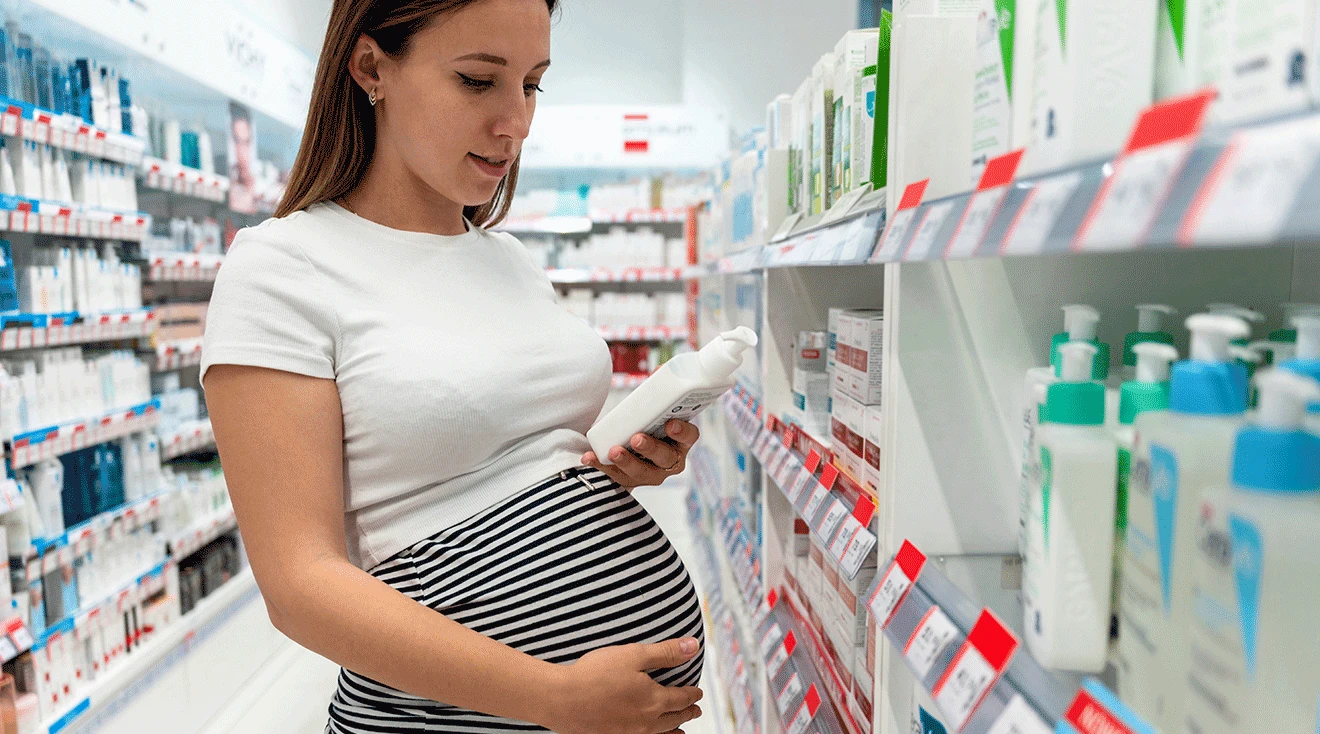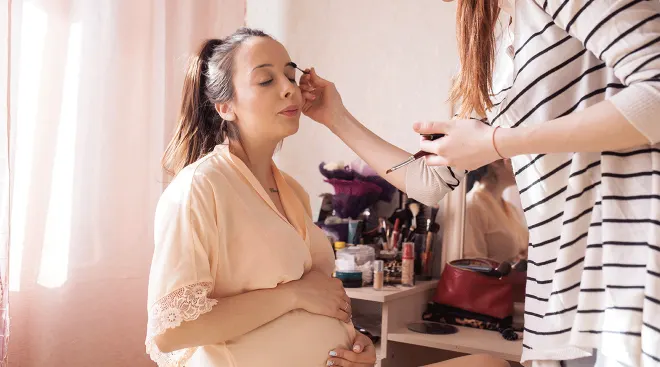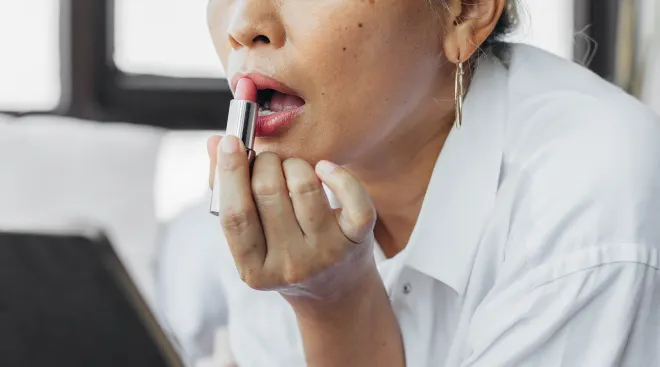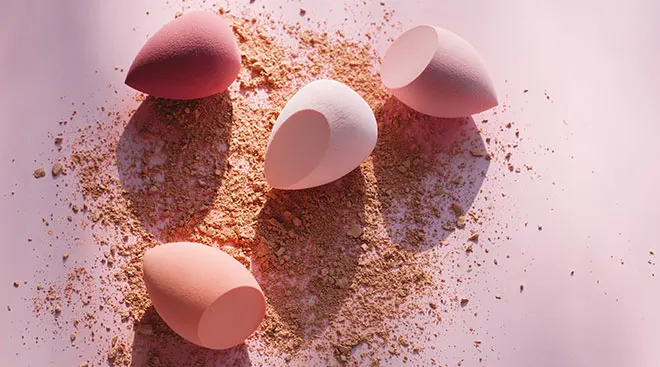Skin-Care Ingredients to Avoid During Pregnancy
You know there’s a long list of foods, medications and more that you need to steer clear of during pregnancy. But what about skin-care ingredients?
The American College of Obstetricians and Gynecologists (ACOG) says that, yes, you should be screening your beauty and skin-care products for certain off-limits chemicals.
In general, it makes sense to err on the side of caution since there’s so much we don’t know. “We lack the research on products that can be used during pregnancy because exposing women and their unborn children to possible harm would be unethical,” says Frances McKindsey, MD, FACOG, an ob-gyn at Torrance Memorial Medical Center in El Segundo, California.
Here’s what you should know about skin-care ingredients to avoid during pregnancy.
Yes, there are skin-care ingredients to avoid during pregnancy—but there are differing schools of thought on which ones. It’s important to keep in mind that you absorb some products more deeply into your skin than others, which can pose potential danger to a developing baby.
It’s also a good idea to avoid skin care that simply doesn’t feel good on your face. “When you’re expecting, the skin can become more sensitive and reactive, so you may notice ingredients you typically can tolerate are now causing irritation,” says Deanne Mraz, MD, FAAD, president and co-founder of Modern Dermatology and assistant clinical professor of dermatology at Yale New Haven Hospital in Connecticut. She explains that phthalates, parabens, formaldehyde, fragrance and alcohol are the most common culprits for causing irritation during pregnancy.
Here are the top skin-care ingredients to avoid during pregnancy, according to experts.
Retinoids
Retinoids are compounds made from vitamin A and are a popular ingredient in anti-aging and acne products. Sometimes you’ll see retinoids listed or referred to as “retinol,” which is just a specific type of retinoid, according to the American Academy of Dermatology Association (AAD).
But in spite of how common they are in OTC skin-care products, there’s some evidence that retinoids increase the risk of birth defects when used during pregnancy—possibly by as much as 20 to 35 percent, according to research.
Mraz says bakuchiol, a plant-based ingredient, is safe and offers similar benefits to retinoids.
Tetracycline
This antibiotic, commonly used to treat severe acne, can be taken orally or used topically, but it’s not recommended in either form for moms-to-be and pregnant people. We have less information about how topical tetracycline affects pregnancy, but oral tetracycline is associated with a higher risk of liver failure in pregnant women and can cause discoloration of the teeth in babies whose mothers used it during pregnancy, according to research.
Erythromycin and clindamycin are considered safer topical antibiotics for acne to use during pregnancy, says Mraz.
Hydroquinone
Hydroquinone is a popular skin-lightening agent found in products like dark-spot correctors. But according to Melanie Palm, MD, dermatologist and cosmetic surgeon at Art of Skin MD in California, it’s classified by the Food and Drug Administration (FDA) as pregnancy category C, which means its effects on a fetus are unknown.
Palm adds that hydroquinone has a very high absorption rate: Research says anywhere from 35 to 45 percent of a product’s hydroquinone is absorbed into your body after topical use—so it’s a smart choice to avoid it when pregnant.
Botox
It’s best to wait until after delivery to get Botox injections or other dermal fillers, says Palm. The jury’s still out on whether Botox is safe for pregnancy—although some recent research found no evidence of increased risk to baby. That said, Botox is made from botulinum toxin, which can have serious side effects. Other types of dermal fillers simply haven’t been well-tested for safety during pregnancy.
There’s a possible exception to the no-Botox rule if you get frequent or severe migraines during pregnancy. “A lot of medicine, specifically for expecting moms, falls under the risk versus reward consideration,” says Mraz.
Adapalene gel
Usually sold as Differin and often available in low concentrations OTC, this topical acne treatment containing the active ingredient adapalene is best avoided during pregnancy. That’s because it’s part of the retinoids family, so its risk is based on what we know about the use of oral retinoids while pregnant.
If you’re looking for pregnancy-safe ways to fight acne, the AAD says that OTC products containing benzoyl peroxide or salicylic acid are safe to use at low doses.
“Acne superstars like salicylic acid and benzoyl peroxide are safe in low concentrations,” says Mraz. She recommends choosing a salicylic acid product with a concentration of less than 2 percent and a benzoyl peroxide product with a concentration of less than 5 percent. She also suggests using cleansers with these ingredients rather than creams or gels, since they don’t sit on the skin for an extended period of time.
Chemical sunscreen ingredients
Both Mraz and Palm recommend switching to mineral sunscreens during pregnancy, which eliminates the use of chemical sunscreen ingredients like oxybenzone, avobenzone, octocrylene and homosalate. These ingredients are easily absorbed into the skin and bloodstream, says Palm, and have recently been flagged as potential endocrine disruptors (though more research is needed). They might also exacerbate melasma because of how they block UV rays, she adds.
Instead of chemical sunscreen, Palm advises pregnant women to look for mineral sunscreen containing zinc oxide or titanium dioxide, and to use protective clothing with a UPF rating of 50 or more for extra sun protection.
Phthalates and parabens
Phthalates and parabens are everywhere, which makes it hard to totally eliminate your exposure. But it might be worth trying to limit or reduce it, especially during pregnancy: Studies have linked both of these chemicals—often found in everyday plastic items like food containers, as well as cosmetics and fragrances—to poor birth outcomes, and ACOG specifically includes them in its list of skin-care ingredients to avoid during pregnancy.
Again, you can’t avoid phthalates and parabens completely, but you can make some simple adjustments to cut down your exposure: Choose glass over plastic food containers, avoid heating up plastics in the microwave, read your cosmetic labels carefully and choose fragrance-free cleaning and beauty products.
Triclosan
ACOG also recommends avoiding triclosan, an antibacterial ingredient found in many cosmetics and personal care products, as much as possible during pregnancy. That’s likely because some research has identified triclosan as an endocrine disruptor—one that may affect baby’s birth weight.
However, different studies point to different outcomes; a 2017 study found that higher levels of triclosan in the urine of pregnant women was associated with lower birth weights while a 2020 study linked triclosan to higher birth weights. Either way, there seems to be a connection between triclosan and fetal growth and development, so this is an ingredient you may want to avoid when choosing toothpastes, deodorants, soaps and other products during pregnancy.
It’s important to choose pregnancy-safe skin-care products when expecting, since some ingredients could affect baby’s development. Luckily, there are many safe alternatives to slather on your skin while pregnant.
Please note: The Bump and the materials and information it contains are not intended to, and do not constitute, medical or other health advice or diagnosis and should not be used as such. You should always consult with a qualified physician or health professional about your specific circumstances.
Plus, more from The Bump:
Frances McKindsey, MD, FACOG, is an ob-gyn at Torrance Memorial Medical Center in El Segundo, California. She earned her medical degree from Howard University College of Medicine.
Deanne Mraz, MD, FAAD, is a dermatologist based in Connecticut. She’s the president and co-founder of Modern Dermatology and assistant clinical professor of dermatology at Yale New Haven Hospital. She earned her medical degree from the University of Rochester School of Medicine and Dentistry and then completed her dermatology residency at Yale New Haven Hospital.
Melanie Palm, MD, MBA, is a dermatologist and cosmetic surgeon at Art of Skin MD in California. She earned her medical degree from the University of Chicago Pritzker School of Medicine.
American College of Obstetricians and Gynecologists, Toxic Chemicals: Steps to Stay Safer Before and During Pregnancy, October 2022
American Academy of Dermatology Association, Retinoid or Retinol?, May 2021
MotherToBaby, Isotretinoin(Accutane®), October 2023
Genetic and Rare Diseases Information Center, Fetal Retinoid Syndrome, June 2024
StatPearls, Tetracycline, June 2023
Canadian Family Physician, Safety of Skin Care Products During Pregnancy, June 2011
Advances in Dermatology and Allergology, The Whole Truth About Botulinum Toxin—A Review, December 2020
Neurology, Pregnancy Outcomes in Patients Exposed to OnabotulinumtoxinA Treatment: A Cumulative 29-Year Safety Update, July 2023
American Academy of Dermatology Association, Is Any Acne Treatment Safe to Use During Pregnancy?
International Journal of Dermatology, The Banned Sunscreen Ingredients and Their Impact on Human Health: A Systematic Review, September 2020
Frontiers in Public Health, The Endocrine Disruption of Prenatal Phthalate Exposure in Mother and Offspring, August 2020
International Journal of Environmental Research and Public Health, Prenatal Exposure to Parabens Affects Birth Outcomes through Maternal Glutathione S-Transferase (GST) Polymorphisms: From the Mothers and Kids Environmental Health (MAKE) Study, March 2021
Environmental Research, Urinary Triclosan Concentrations During Pregnancy and Birth Outcomes, July 2017
Journal of Research in Medical Sciences, Impact of Prenatal Triclosan Exposure on Gestational Age and Anthropometric Measures at Birth: A Systematic Review and Meta-Analysis, 2020
Learn how we ensure the accuracy of our content through our editorial and medical review process.
Navigate forward to interact with the calendar and select a date. Press the question mark key to get the keyboard shortcuts for changing dates.





















































